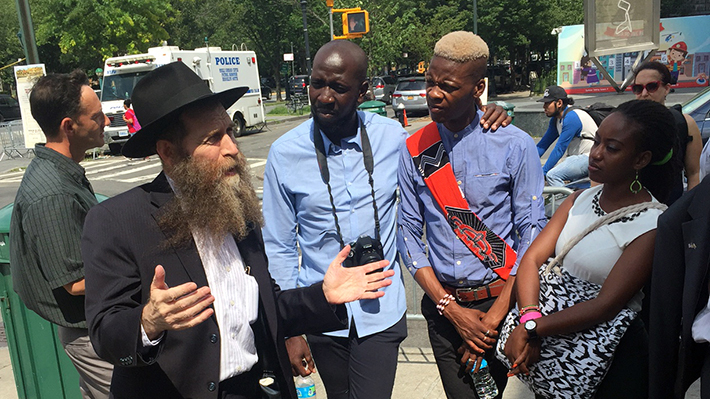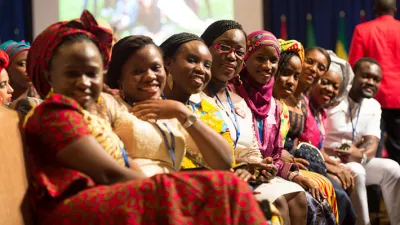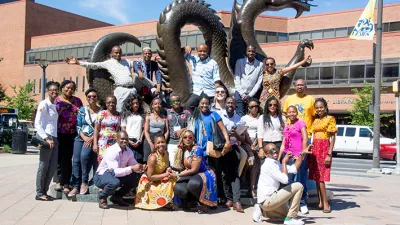
Mandela Fellows Explore Race Relations in New York City
Developing unity, improving race relations and bringing communities together are challenges that cut across continents. And they were the topic of conversation when 25 civic leaders from countries across Africa traveled to New York City as part of the Mandela Washington Fellows program, hosted by the Institute for Strategic Leadership at the LeBow College of Business and Drexel’s Office of International Programs.
On July 18, the fellows joined LeBow and International Programs staff at the United Nations in Manhattan, where they visited a number of committee chambers and learned about the UN’s Sustainable Development Goals and peacekeeping efforts currently impacting African nations.
During the afternoon, the group traveled to Crown Heights in Brooklyn to meet community leaders who have worked to ease racial tension, crime and violence in the neighborhood.
Prior to the trip, the fellows learned about the history of Crown Heights and specifically the racial tension and violence following the 1991 death of Gavin Cato, a young African American boy from the neighborhood, due to a car accident. The driver of the car was member of the Hasidic Jewish community, and the incident sparked three days of riots and violence against members of the Jewish community in the neighborhood.
“The opportunity to meet with a variety of civic leaders centered around Crown Heights’ development, reconciliation and mutual understanding was instrumental to our Institute’s learning outcomes,” said Adam Zahn, associate director of the Office of International Programs.
Cindy Greenberg of Repair the World NYC hosted the group and coordinated visits to three organizations that were central to bringing the community together after that turbulent time and continuing the neighborhood’s progress.
First the group visited the Crown Heights Mediation Center where director Amy Ellenbogen offered more background on the incident as well as the work her organization is doing to reduce gun violence in the community.
Next, the fellows met with Rabbi Eli Cohen, executive director of the Crown Heights Jewish Community Council, at the Chabad Lubavitch World Headquarters. Cohen is a leader in the Lubavitch Hasidic community and was present in Brooklyn during the violence. He shared his experience of the incident and answered questions about the Hasidic community. He also stressed the importance of reaching out a hand to your neighbors.
Finally, the group joined Professor Richard Green at the Crown Heights Youth Collective. He also shared his experience in Brooklyn at the time of the violence and spoke about finding common ground between different communities. He also stressed the importance of technology in sharing information and bringing people together.
At the end of the day, the fellows returned to Repair the World for dinner with staff and volunteers and reflection on the day.
For many, the day’s experience was eye opening and inspiring. Many were surprised by how racism still impacts the U.S., as it does in their countries. But they saw what has happened in Crown Heights as an indication of what is possible.
Nickolaus Bauer, a journalist and civic leader from Johannesburg, South Africa, found inspiration in the words of Green. As his home country deals with racial tension due to apartheid, it can seem impossible for the opposing groups to find common ground. But Green pointed out that even the smallest commonality can connect people. He shared this through the example of his love of jelly beans, a love he shares with former president Ronald Reagan. It is unlikely the two would have much in common, but sometimes you have to look deeper to find the commonality. This story stuck with Bauer and gave him hope for his country.
Many others felt inspired by the relationships between the community leaders they met throughout the day and made commitments to getting to know their neighbors when they return home at the end of the fellowship.
“We wanted our fellows to hear about issues of racism and discrimination in our country and how they have impacted people of many different races, religions, ethnicities and genders,” said Alison Young, Executive Director of LeBow’s Institute for Strategic Leadership. “By walking the neighborhood with community leaders and having personal conversations rather than presentations, the fellows experienced a unique immersion and learning experience that they’re still talking about.”
The 25 young African civic leaders visited the United Nations and met with community leaders in Brooklyn during a trip to New York City.
The LeBow Institute for Strategic Leadership connects world-class research with the global business community to effectively steer organizations.
A group of 25 young civic leaders from across Africa are in the midst of a six-week fellowship program at LeBow to develop the skills needed to drive systemic changes in their home countries.

